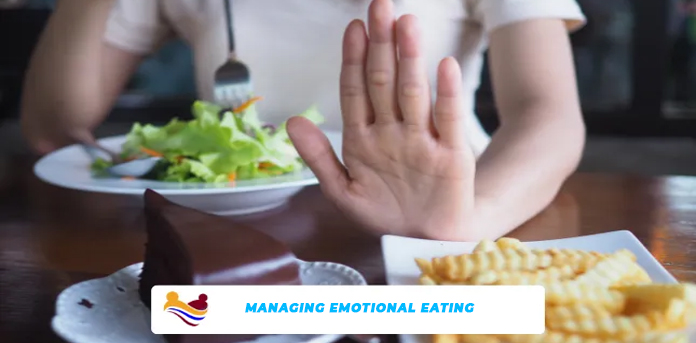Many of us experience emotional eating, but it doesn’t have to dominate our lives. By identifying what triggers emotional eating and practicing mindfulness, we can overcome its hold on us and establish a healthier relationship with food. This is a journey that requires patience and self-compassion.
During life’s ups and downs, we may turn to food for comfort, but this can create an unhealthy connection between our emotions and eating habits. But fear not, for we are here to guide you toward a path of liberation and empowerment. Join us as we unlock the secrets to conquering emotional eating triggers, offering invaluable insights on how to foster a harmonious relationship with food. Discover a wealth of tips that not only nourish your body but also nurture your emotional well-being. Your journey to a healthier you begins here.
What Is Emotional Eating

Do you ever reach for food when you’re feeling stressed, bored, sad, or lonely? This is known as emotional eating, which is when you turn to food for comfort or distraction to ease emotional discomfort. Unlike eating because you’re physically hungry, this type of eating can lead to overeating and an unhealthy relationship with food. It’s important to recognize and address emotional eating to maintain a balanced diet and overall well-being.
Understanding Emotional Eating Triggers
In order to effectively tackle emotional eating, it is important to first identify its triggers. This type of eating is a common reaction to different emotions like stress, boredom, loneliness, and sadness. Sometimes, we may turn to food as a way to feel better and temporarily escape these feelings. However, this habit can quickly become a cycle of emotional eating that can negatively affect both our physical and emotional well-being.
Strategies To Overcome Emotional Eating
Mindfulness Techniques
Mindfulness is a powerful tool that can help you break free from the grip of emotional eating. By becoming more aware of your thoughts, feelings, and bodily sensations, you can recognize emotional triggers as they arise. Practicing mindfulness while eating also allows you to savor every bite, preventing impulsive overeating. Before you reach for that snack, take a moment to check in with yourself. Are you eating out of hunger or something else?
Creating Healthy Alternatives
Instead of reaching for unhealthy comfort foods, consider planning nutritious alternatives that can satisfy both your taste buds and your emotional needs. Stock your kitchen with a variety of fresh fruits, vegetables, nuts, and whole grains. When the urge to emotionally eat strikes, opt for a bowl of mixed berries or a handful of almonds. These choices can provide the comfort you seek without guilt.
Emotional Awareness
One of the first steps to overcoming emotional eating is acknowledging the emotions driving it. Keeping an emotional food journal can be incredibly enlightening. Whenever you feel the urge to eat emotionally, jot down the emotion you’re experiencing, the trigger, and what you ate. Over time, patterns may emerge, allowing you to address the root causes of your eating disorders.
Stress Management
Stress is a significant driver of emotional eating for many individuals. To combat this, integrate stress-reduction activities into your daily routine. Engage in activities like meditation, yoga, or deep breathing exercises. These practices not only help you manage stress but also provide alternative outlets for your emotions, reducing the need to turn to food for comfort.
Building A Healthier Relationship With Food
As you navigate the path to overcoming emotional eating, consider embracing the principles of intuitive eating. Intuitive eating encourages you to listen to your body’s cues of hunger and fullness. Instead of rigid diets, it focuses on eating when you’re hungry and stopping when you’re satisfied. By paying attention to your body’s signals, you can develop a more balanced and harmonious relationship with food.
Seeking Professional Support
It is important to note that even though the following strategies can be helpful, overcoming ingrained emotional eating habits may require professional help. If you feel that your emotional eating is overpowering and negatively affecting your overall health and happiness? Seeking guidance from a therapist or registered dietitian may be a wise choice. They can provide personalized advice and techniques to help you manage the challenges you’re facing.
As you incorporate these strategies into your life, you’ll gradually develop a more balanced and fulfilling relationship with your emotions and food. Embrace the changes, appreciate each step, and let your journey towards overcoming emotional eating empower you to live a healthier and happier life.
FAQs
What exactly is emotional eating, and how does it differ from regular eating habits?
Emotional eating refers to the practice of turning to food as a way to cope with emotions, such as stress, boredom, loneliness, or sadness. Unlike regular eating habits that are driven by physical hunger, it is often triggered by feelings and emotions. It’s a way to find comfort or distraction from emotional discomfort. This can lead to consuming food mindlessly and in larger quantities than what your body actually needs. Over time, this type of eating can contribute to an unhealthy relationship with food and potentially lead to weight gain and other health issues.
How can mindfulness techniques help in overcoming emotional eating?
Mindfulness techniques play a significant role in addressing emotional eating triggers. Mindfulness involves being fully present at the moment and observing your thoughts, emotions, and bodily sensations without judgment. When it comes to emotional eating, practicing mindfulness can help you become more aware of the emotions that trigger your desire to eat. By recognizing these emotions as they arise, you can pause and choose a more intentional response instead of turning to food automatically. Mindful eating, which involves savoring each bite and paying attention to how the food makes you feel. It can also prevent impulsive overeating and promote healthier eating habits.
How does intuitive eating contribute to building a healthier relationship with food?
Intuitive eating is a philosophy that encourages you to listen to your body’s natural cues of hunger and fullness. Rather than following strict diets or external rules, intuitive eating empowers you to eat when you’re hungry and stop when you’re satisfied. This approach can be particularly beneficial in overcoming this type of eating. By tuning into your body’s signals, you can distinguish between true hunger and emotional triggers. Intuitive eating fosters a sense of self-awareness and trust in your body, leading to a more balanced and harmonious relationship with food. It also focuses on enjoying a wide variety of foods without guilt, which can help break the cycle of restrictive eating followed by emotional overeating.

